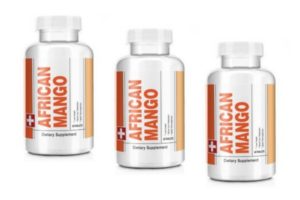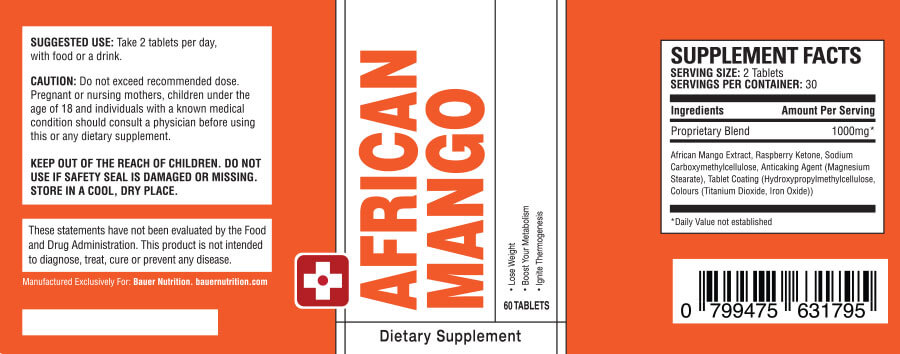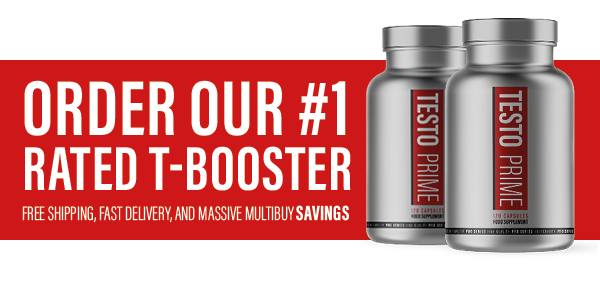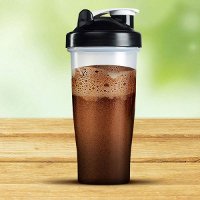African Mango is a fruit which is well known for its anti-oxidant properties which combine with weight loss benefits to provide all-round results. Tour formula not only helps to burn fat and suppress appetite, it also speeds up the metabolism to attack fat from three different angles.
BAUER Nutrition ™ – African Mango benefits:
- Suppress appetite to stop between-meal snacking
- Convert carbs into energy instead of fat
- Burn fat faster
- Contains anti-oxidants to help boost immune system
BAUER Nutrition ™ – African Mango – Ingredients
BAUER Nutrition ™ African Mango is a specially developed formula consisting of two primary active ingredients: African Mango and Raspberry Ketone.
| Ingredients | |
|---|---|
| African Mango (Irvingia gabonensis) | African Mango has been shown to help suppress appetite by reducing levels of a hormone that makes us hungry. It also tricks the hypothalamus (the brain’s weight and appetite management mechanism) into keeping the body’s metabolism healthy. |
| Raspberry Ketones | Raspberry Ketones can not only help the body break down excess weight naturally, but have been shown to have a connection with the secretion of adiponectin, a hormone that regulates many metabolic processes and the percentage of fat in the body. Higher levels of adiponectin equal lower fat levels. |
The exact amounts involved are a closely guarded secret but overall each pill provides 500 mg of the protected formula.
The African Mango provides the appetite suppression by tricking the brain in to believing you are full and also into boosting your metabolism. Raspberry Ketone provides the fat burning benefits.
Fact Sheet: BAUER Nutrition ™ – African Mango – Fact Sheet.
Directions for Use
Take 1 capsule per day with food or water. Each bottle contains 30 servings.
African mango’s unique formula provides an all-in-one weight managment solution
- Manage your weight easily
- Reduce your appetite to stop in between meal snacking
- Help increase calorie use
- Promotes the conversion of carbs into energy instead of fat
- Appetite control to aid weight loss
- See results within only a few days
This produkt took 3dr place in the “Ranking of pills to lose weight” in subcategory: Ranking of slimming tablets containing African mango.
References & External links
- Morimoto, Chie, et al. “Anti-obese action of raspberry ketone.” Life sciences 77.2 (2005): 194-204. “In conclusion, RK prevents and improves obesity and fatty liver. These effects appear to stem from the action of RK in altering the lipid metabolism, or more specifically, in increasing norepinephrine-induced lipolysis in white adipocytes.“
- Lopez, Hector L., et al. “Eight weeks of supplementation with a multi-ingredient weight loss product enhances body composition, reduces hip and waist girth, and increases energy levels in overweight men and women.” Journal of the International Society of Sports Nutrition 10.1 (2013): 1.
- Ogawa, Yoshihisa, et al. “Effect of essential oils, such as raspberry ketone and its derivatives, on antiandrogenic activity based on in vitro reporter gene assay.” Bioorganic & medicinal chemistry letters 20.7 (2010): 2111-2114. “Raspberry ketone, which has threefold higher anti-obese activity than that of capsaicin.“
- 4-(4-Hydroxyphenyl)-2-butanone – https://pubchem.ncbi.nlm.nih.gov/compound/21648.
- Raspberry ketone – http://www.chemspider.com/Chemical-Structure.20347.html?rid=b7a5916a-39bd-48ec-b7c7-7fed4c375289.
- Wang, J-G. “4-(4-Hydroxyphenyl) butan-2-one.” Acta Crystallographica Section E: Structure Reports Online 67.6 (2011): o1411-o1411.
- Larsen, Mette, and Leif Poll. “Odour thresholds of some important aroma compounds in raspberries.” Zeitschrift für Lebensmittel-Untersuchung und Forschung 191.2 (1990): 129-131.
- Kosjek, Birgit, et al. “Efficient production of raspberry ketone via ‘green’biocatalytic oxidation.” Tetrahedron 59.48 (2003): 9517-9521.
- Chemical composition and functional properties of raw, heat-treated and partially proteolysed wild mango (Irvingia gabonensis) seed flour, Sunday Y. Giami, Vitalis I. Okonkwo, Monday O. Akusu, Food Chemistry, Volume 49, Issue 3, 1994, Pages 237-243.
- Polyphenolic compounds and antioxidant properties in mango fruits, Xiaowei Ma, Hongxia Wu, Liqin Liu, Quansheng Yao, Songbiao Wang, Rulin Zhan, Shanshan Xing, Yigang Zhou, Scientia Horticulturae, Volume 129, Issue 1, 25 May 2011, Pages 102–107.
- African Mango Glycosidically Bound Volatile Compounds, M. Sakho, D. Chassagne, J. Crouzet, J. Agric. Food Chem., 1997, 45 (3), pp 883–888.
- Chemical and Amino Acid Composition of Raw and Defatted African Mango (Irvingia gabonensis) Kernel, Ogungbenle Henry Niyi, British Biotechnology Journal, ISSN: 2231-2927,Vol.: 4, Issue.: 3 (March).
- IGOB131, a novel seed extract of the West African plant Irvingia gabonensis, significantly reduces body weight and improves metabolic parameters in overweight humans in a randomized double-blind placebo controlled investigation, Ngondi JL, Etoundi BC, Nyangono CB, Mbofung CM, Oben JE, Lipids Health Dis. 2009 Mar 2;8:7.
- The effect of Irvingia gabonensis seeds on body weight and blood lipids of obese subjects in Cameroon, Judith L Ngondi, Julius E Oben, Samuel R Minka, Lipids Health Dis. 2005, 4.
- The use of a Cissus quadrangularis / Irvingia gabonensis combination in the management of weight loss: a double-blind placebo-controlled study, Julius E Oben, Judith L Ngondi, Claudia N Momo, Gabriel A Agbor, Caroline S Makamto Sobgui, Lipids Health Dis. 2008;31.
- Mango seed uses: thermal behaviour of mango seed almond fat and its mixtures with cocoa butter, J.A. Solı́s-Fuentesa, M.C. Durán-de-Bazúab, Bioresource Technology, Volume 92, Issue 1, March 2004, Pages 71–78.
- Physico-chemical changes in African mango (Irvingia gabonensis) during normal storage ripening, Johnson O. Aina, Food Chemistry, Volume 36, Issue 3, 1990, Pages 205-212.
- Studies on the effects of microbial fermentation on bush mango (Irvingia gabonensis) seed cotyledons, Ekundayo F. O., Oladipupo O. A., Ekundayo E. A., African Journal of Microbiology Research 7, no. 34 (2013): 4363-4367.
- Lihn, A. S., Steen Bønløkke Pedersen, and Bjørn Richelsen. “Adiponectin: action, regulation and association to insulin sensitivity.” Obesity reviews 6.1 (2005): 13-21.






















